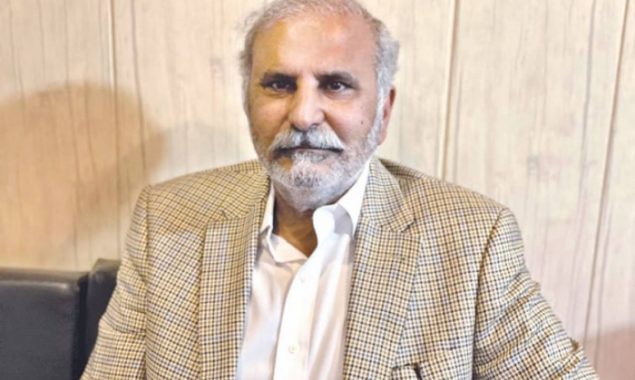
Punjab Agriculture Minister Syed Hussain Jahania Gardezi. File photo
ISLAMABAD: Rice is the most important human food crop in the world, directly feeding more people than any other crop, a government official said.
Speaking as the chief guest at the seminar on “Public Private Partnership in Rice towards Crop Sustainability and Farmers Livelihood”, organised by the Rice Partners (Pvt) Limited, Punjab Agriculture Minister Syed Hussain Jahania Gardezi said that it is amazingly diverse, both in the way it is grown and how it is used by humans.
Rice is the third most important crop of Pakistan, which covers an area of 2.89 million hectares, with milled rice production of 7.44 million tonnes, he said and highlighted the interventions made by the government for the development of the agriculture sector.
Rice Partners (Pvt) Limited chief executive office Muhammad Ali Tariq, Rice Research Institute Kala Shah Kaku director Dr Muhammad Rafique, General Agri Extension Punjab director Dr Muhammad Anjum Ali Buttar, head of Smart Farmer Community, RPL, Zafar Iqbal, Agri Extension Multan director Dr Shehzad ul Haq and RPL senior adviser Dr Riaz Mann highlighted the significance of water productivity and sustainable rice production.
The minister said rice is unique because it can grow in wet environments that other crops cannot survive in. He said such wet environments are abundant across Asia, particularly in Pakistan.
The domestication of rice ranks as one of the most important developments in history and now thousands of rice varieties are cultivated on every continent except Antarctica, he said.
Muhammad Ali Tariq said that despite having more glaciers than anywhere else in the world and its location in the Indus River Basin, Pakistan continues to experience acute water scarcity, largely driven by drought and intensive agriculture.
Pakistan has an extensive agriculture sector, which uses flood methods of irrigation to grow water-intensive crops, he said.
The RPL chief executive officer said water infrastructure in Pakistan is outdated and in dilapidated condition, which wastes even more water, while little is stored because of the lack of reservoirs and sediment build-up in the existing facilities.
“We have to develop an action plan and implement it in true spirit so that the farmers would produce the rice with minimum use of water without any yield or quality penalty.”
Dr Muhammad Rafique said that modern mechanical harvesting of basmati rice varieties at the premature stage is common, leading to increased post-harvest losses and infestation of microbial organisms in the paddy due to improper drying and storage facilities.
Zafar Iqbal said that RPL has trained thousands of farmers on sustainable rice production and also provided them the facility of land laser leveling on a 50 per cent cost sharing basis.
RPL has provided Alternative Wetting and Drying Tubes (AWD Tubes) and safety kits to thousands of farmers’ free-of-charge, he said.
He also said RPL considered that the dream of sustainable rice production cannot fulfill without betterment of the agriculture labourers so RPL has made various interventions, i.e., skill development programme, childcare facilities, training on human rights and free healthcare facilities.
He said all these interventions are being done with the intention to ensure decent working conditions in the rice value chain of Pakistan.
Thousands of agriculture labourers have been benefitted through these interventions.
Dr Shehzad ul Haq said that presently the irrigation system is being implemented through the public-private partnership (PPP) due to the inefficiency of the public sector. The PPP is a better approach due to public sector financing and efficiency of the private sector.
Dr Muhammad Anjum Ali Buttar said that the present government is highly dedicated to improvise the agriculture sector of Pakistan. For this purpose, a lot of subsidy schemes have been launched and these schemes are profiting the farmers, he said.
Still there is a need to revise the schemes so that the small landholder farmers could also benefit from these schemes, he said.
He stressed that other rice mill-owners should follow the water productivity model of RPL to reduce the consumption of water and to enhance the water productivity.
Read More News On
Catch all the Business News, Breaking News Event and Latest News Updates on The BOL News
Download The BOL News App to get the Daily News Update & Follow us on Google News.




